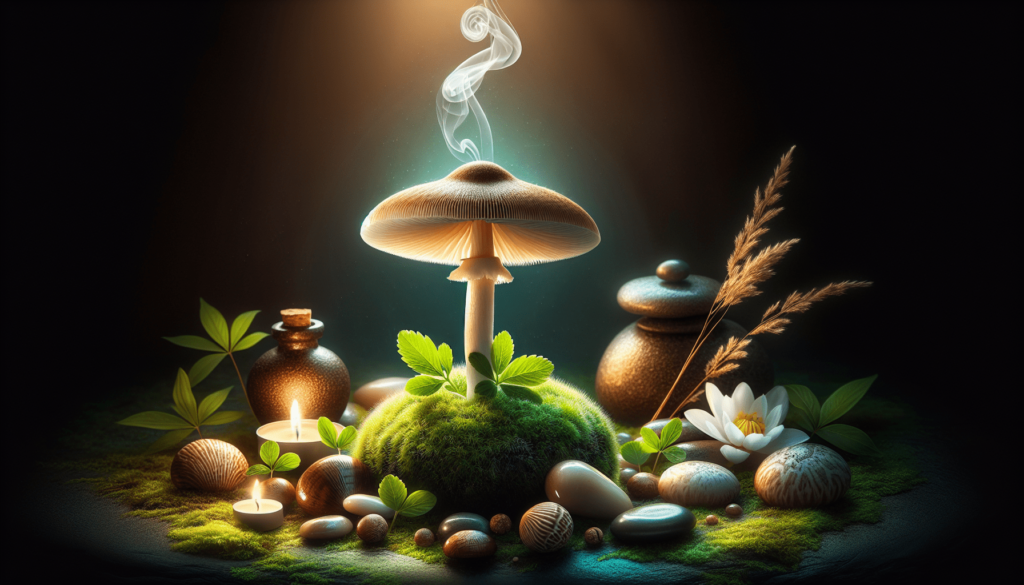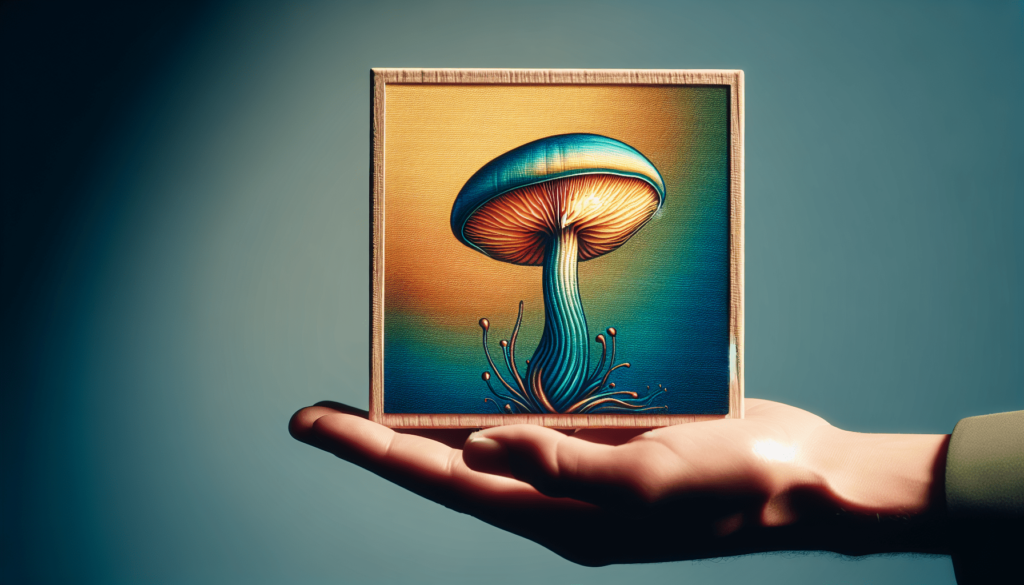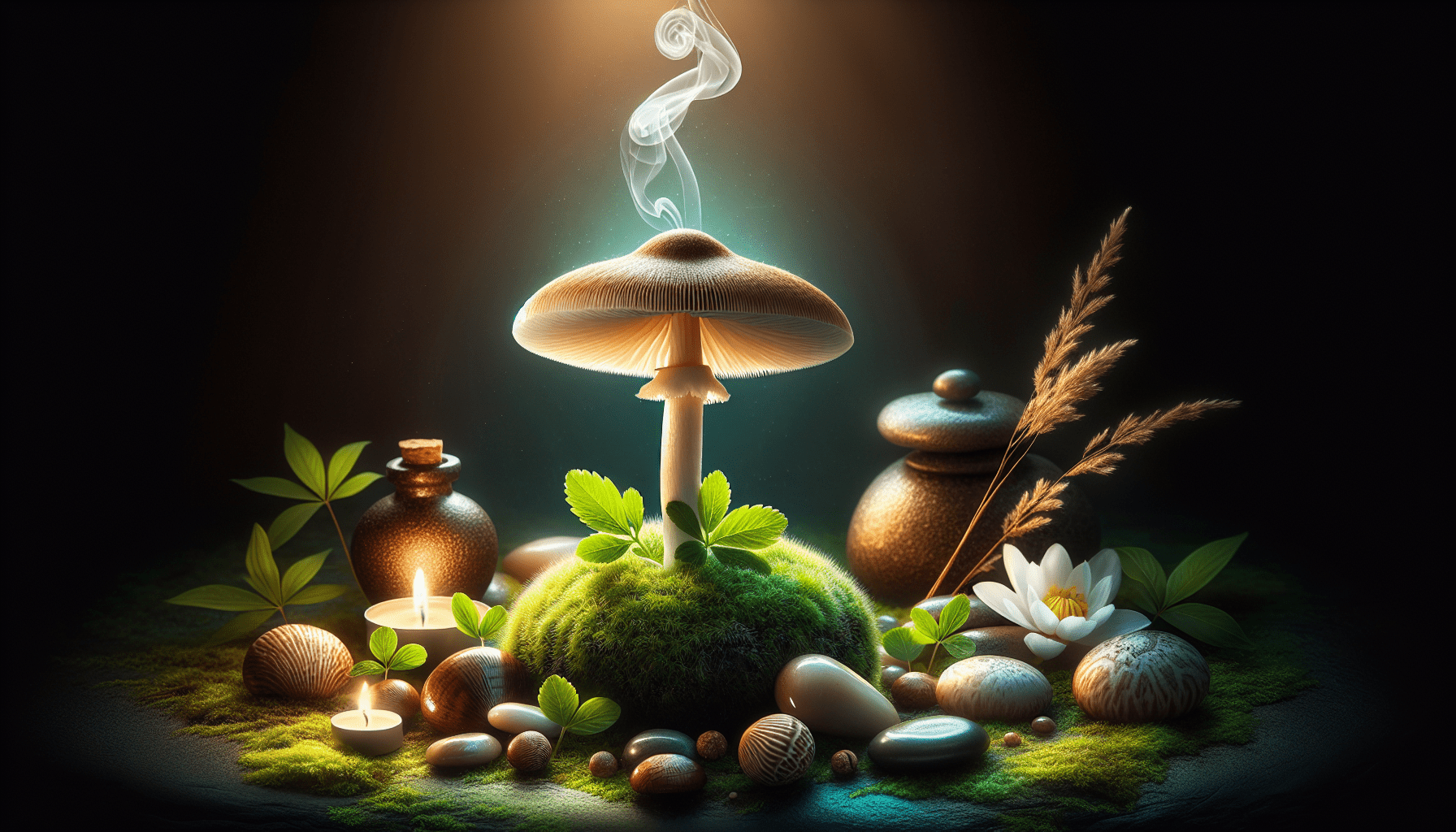Are you looking for a natural way to combat anxiety? Look no further than medicinal mushrooms! These incredible fungi have been used for centuries in traditional medicine to promote relaxation and calmness. With their abundance of health-boosting compounds, medicinal mushrooms have become increasingly popular as an alternative treatment for anxiety. From reishi to lion’s mane, these mushrooms offer a variety of benefits that can help soothe your mind and reduce stress. Discover the power of medicinal mushrooms for anxiety and find the peace you’ve been searching for.

Types of Medicinal Mushrooms
1. Reishi Mushroom
Reishi mushroom, also known as Ganoderma lucidum, is a popular medicinal mushroom used for its various health benefits. It has been traditionally used in Eastern medicine for centuries and is known for its ability to boost the immune system, improve sleep quality, and reduce anxiety. Reishi mushroom contains bioactive compounds such as triterpenoids and polysaccharides, which contribute to its therapeutic properties.
2. Lion’s Mane Mushroom
Lion’s Mane mushroom, scientifically known as Hericium erinaceus, is a unique mushroom with long, shaggy spines that resemble a lion’s mane. This mushroom has gained attention in recent years for its potential benefits on cognitive function and mental health. Lion’s Mane is believed to stimulate the production of nerve growth factors, which play a crucial role in brain function and nerve regeneration. By promoting the growth of healthy brain cells, Lion’s Mane may help alleviate anxiety symptoms and enhance cognitive performance.
3. Cordyceps Mushroom
Cordyceps mushroom, scientifically known as Cordyceps sinensis, has been utilized in traditional Chinese medicine for centuries due to its wide range of health benefits. This unique mushroom is known for its adaptogenic properties, meaning it helps the body adapt to stress and restore balance. Cordyceps mushroom may help reduce anxiety by regulating the body’s stress response and supporting adrenal function.
4. Chaga Mushroom
Chaga mushroom, scientifically named Inonotus obliquus, is a type of fungi that grows on birch trees in colder regions. It is highly valued for its potent antioxidant and anti-inflammatory properties. These properties may help reduce anxiety by combating oxidative stress and reducing inflammation in the body.
5. Turkey Tail Mushroom
Turkey Tail mushroom, scientifically known as Trametes versicolor, is a common medicinal mushroom that resembles the tail feathers of a turkey. It is rich in polysaccharides, which are known for their immune-stimulating effects. By supporting immune function, Turkey Tail may indirectly help reduce anxiety by preventing illness and promoting overall well-being.
Benefits for Anxiety Relief
1. Regulation of Stress Hormones
Medicinal mushrooms, such as Reishi and Cordyceps, have been studied for their potential to regulate stress hormones in the body. Chronic stress can lead to an imbalance in stress hormones like cortisol, which can contribute to anxiety symptoms. By modulating these hormones, medicinal mushrooms may help promote a sense of calm and relaxation.
2. Reduction of Inflammation
Studies have shown that chronic inflammation can have a negative impact on mental health, including anxiety. Medicinal mushrooms, such as Chaga, have been found to possess strong anti-inflammatory properties. By reducing inflammation in the body, these mushrooms may help alleviate anxiety symptoms.
3. Enhancement of Cognitive Function
Certain medicinal mushrooms, like Lion’s Mane, have been studied for their potential cognitive-enhancing effects. Anxiety can often impair cognitive function, including memory and concentration. Lion’s Mane mushroom promotes the production of nerve growth factors, which are essential for brain health and cognitive function. By supporting brain health, this mushroom may help improve cognitive function and reduce anxiety.
4. Improvement of Sleep Quality
Sleep disturbances are commonly associated with anxiety disorders. Reishi mushroom has been traditionally used to improve sleep quality and promote relaxation. It contains bioactive compounds that possess sedative properties, potentially helping individuals with anxiety achieve better sleep.
5. Boosting of Mood and Relaxation
Medicinal mushrooms, like Turkey Tail, may indirectly boost mood and promote relaxation by supporting overall well-being. By enhancing immune function and preventing illness, these mushrooms can help reduce physical and mental stress, leading to improved mood and relaxation.
Mechanisms of Action
1. Modulation of Neurotransmitters
Neurotransmitters, such as serotonin and dopamine, play a vital role in regulating mood and anxiety levels. Certain medicinal mushrooms, including Reishi and Lion’s Mane, have been found to modulate neurotransmitter levels in the brain. By promoting the production and regulation of these neurotransmitters, these mushrooms may help alleviate anxiety symptoms.
2. Regulation of the Hypothalamic-Pituitary-Adrenal (HPA) Axis
The HPA axis is a complex system that regulates the body’s stress response. Chronic activation of the HPA axis can contribute to anxiety disorders. Medicinal mushrooms, such as Cordyceps, have been studied for their potential to regulate the HPA axis and restore balance to the stress response system. By modulating this axis, these mushrooms may help reduce anxiety.
3. Antioxidant and Anti-inflammatory Properties
Oxidative stress and chronic inflammation are associated with the development and progression of anxiety disorders. Medicinal mushrooms, like Chaga, possess potent antioxidant and anti-inflammatory properties, which can help combat oxidative stress and reduce inflammation in the body. By addressing these underlying factors, these mushrooms may provide relief from anxiety symptoms.
4. Stimulation of Nerve Growth Factors
Nerve growth factors are essential for the growth, development, and maintenance of healthy brain cells. Medicinal mushrooms, such as Lion’s Mane, stimulate the production of nerve growth factors, promoting brain health and enhancing cognitive function. By supporting brain health, these mushrooms may indirectly alleviate anxiety symptoms.
5. Regulation of Gut Microbiota
Emerging research suggests a strong connection between gut health and mental health. Medicinal mushrooms, like Turkey Tail, have been found to modulate the gut microbiota, promoting a healthy balance of beneficial bacteria. By supporting gut health, these mushrooms may positively impact mental health, including anxiety symptoms.
Clinical Studies and Research
1. Study on Reishi Mushroom’s Anxiety-Reducing Effects
A study published in the Journal of Ethnopharmacology evaluated the anxiolytic effects of Reishi mushroom in rats. The results showed that Reishi mushroom extract significantly reduced anxiety-like behavior in the rats. The researchers concluded that Reishi mushroom may possess anxiolytic properties and could be a potential natural remedy for anxiety disorders.
2. Lion’s Mane Mushroom and Cognitive Function
A systematic review published in the Journal of Dietary Supplements examined the effects of Lion’s Mane mushroom on cognitive function. The review analyzed several studies and found that Lion’s Mane consumption was associated with improvements in cognitive function, including memory and attention. While further research is needed, these findings suggest the potential cognitive benefits of Lion’s Mane mushroom.
3. Cordyceps Mushroom and Stress Relief
A randomized, double-blind, placebo-controlled study published in the Journal of Alternative and Complementary Medicine investigated the effects of Cordyceps mushroom on stress symptoms in individuals with chronic fatigue syndrome. The study found that Cordyceps supplementation significantly reduced stress-related symptoms, including anxiety. The researchers concluded that Cordyceps mushroom may be a beneficial adjunct therapy for stress management.
4. Chaga Mushroom and Anti-inflammatory Properties
Research published in the International Journal of Biological Macromolecules investigated the anti-inflammatory effects of Chaga mushroom extract. The study found that Chaga mushroom exhibited strong anti-inflammatory properties by inhibiting the production of pro-inflammatory cytokines. These results suggest that Chaga mushroom may help reduce inflammation in the body, potentially alleviating anxiety symptoms.
5. Turkey Tail Mushroom and Immune Function
A study published in the International Journal of Medicinal Mushrooms examined the immunomodulating effects of Turkey Tail mushroom. The study found that Turkey Tail supplementation significantly enhanced various markers of immune function, including natural killer cell activity. By supporting immune function, Turkey Tail mushroom may indirectly benefit mental health and provide relief from anxiety symptoms.

Dosage and Administration
1. Consultation with a Healthcare Professional
Before incorporating medicinal mushrooms into your routine, it is essential to consult with a healthcare professional. They can assess your individual needs, medical history, and potential interactions with medications or existing conditions.
2. Recommended Dosages for Different Mushroom Types
The optimal dosage of medicinal mushrooms can vary depending on the specific mushroom and individual factors. However, general dosage guidelines suggest taking 1-3 grams of dried mushroom extract daily for Reishi, Lion’s Mane, Cordyceps, and Turkey Tail mushrooms. For Chaga mushroom, the recommended dosage is 1-2 grams of dried mushroom extract daily. It is essential to follow the recommended dosages and adjust as necessary under the guidance of a healthcare professional.
3. Forms of Medicinal Mushroom Supplements
Medicinal mushrooms are available in various forms, including capsules, powders, teas, and tinctures. The choice of form depends on personal preference and convenience. Capsules and powders are commonly used for their ease of administration, while teas and tinctures may offer a more traditional approach. It is important to choose reputable brands and products to ensure quality and potency.
Possible Side Effects
1. Allergic Reactions
Individuals with known allergies to mushrooms should exercise caution when consuming medicinal mushrooms. Allergic reactions can range from mild symptoms, such as itching and hives, to severe reactions like difficulty breathing or anaphylaxis. It is essential to discontinue use and seek medical attention if experiencing any allergic symptoms.
2. Digestive Issues
Some individuals may experience digestive issues when consuming medicinal mushrooms. Common side effects may include bloating, gas, stomach discomfort, or diarrhea. Starting with a lower dosage and gradually increasing can help minimize digestive issues. If symptoms persist or worsen, it is recommended to discontinue use and consult a healthcare professional.
3. Interactions with Medications
Medicinal mushrooms may interact with certain medications, including blood thinners, immunosuppressants, and antidiabetic drugs. These interactions can lead to adverse effects or reduced efficacy of medications. It is crucial to inform your healthcare professional about any medications you are currently taking to determine potential interactions.
4. Unsafe for Pregnant or Breastfeeding Women
The safety of medicinal mushrooms during pregnancy and breastfeeding has not been adequately studied. It is generally advised for pregnant or breastfeeding women to avoid medicinal mushroom supplements to avoid potential risks to themselves or their infants. Consulting with a healthcare professional is essential in these cases.
Precautions and Warnings
1. Avoiding Wild Mushrooms
While some mushrooms have therapeutic properties, wild mushrooms can be potentially toxic or even fatal if ingested. It is important to avoid foraging and consuming wild mushrooms unless you are an experienced mycologist. It is safer to rely on cultivated and commercially available medicinal mushroom supplements.
2. Identifying Reliable Sources
To ensure the safety and efficacy of medicinal mushroom supplements, it is crucial to choose products from reputable and trustworthy sources. Look for brands that adhere to quality standards, perform third-party testing, and provide transparent information about sourcing and production practices. This helps ensure that you are getting a high-quality product without unnecessary contaminants or impurities.
3. Monitoring for Adverse Reactions
It is important to monitor your body’s response to medicinal mushroom supplements. Pay attention to any changes, especially concerning allergic reactions or digestive issues. If you experience any adverse effects, discontinue use and consult a healthcare professional.
Mushrooms as Complementary Therapy
1. Integration with Traditional Treatment Approaches
Medicinal mushrooms should not be used as a substitute for conventional treatments for anxiety disorders. They can, however, be incorporated as a complementary therapy to supplement traditional approaches. It is essential to work closely with healthcare professionals to determine the best treatment plan for your individual needs.
2. Combined Benefits with Other Herbs and Supplements
Combining medicinal mushrooms with other herbs and supplements may enhance their overall benefits. For example, combining Reishi mushroom with herbs like Ashwagandha or Rhodiola may provide synergistic effects on stress reduction. However, it is important to consult a healthcare professional before combining different supplements to ensure their safety and efficacy.
3. Mindfulness and Meditation Practices
Mindfulness and meditation practices can be beneficial for managing anxiety. Combining these practices with medicinal mushroom supplementation may promote a more holistic approach to anxiety relief. Practicing mindfulness and meditation techniques can help reduce stress and promote relaxation, complementing the effects of medicinal mushrooms.
Conclusion
Medicinal mushrooms offer promise as a natural approach to anxiety relief. Reishi, Lion’s Mane, Cordyceps, Chaga, and Turkey Tail mushrooms possess unique therapeutic properties that contribute to their potential benefits. From regulating stress hormones and reducing inflammation to enhancing cognitive function and improving sleep quality, these mushrooms can have a positive impact on anxiety symptoms. However, it is important to exercise caution, consult with healthcare professionals, and choose high-quality products from reliable sources. By incorporating medicinal mushrooms as a complementary therapy alongside traditional approaches and mindfulness practices, individuals may find holistic support on their journey to anxiety relief.
